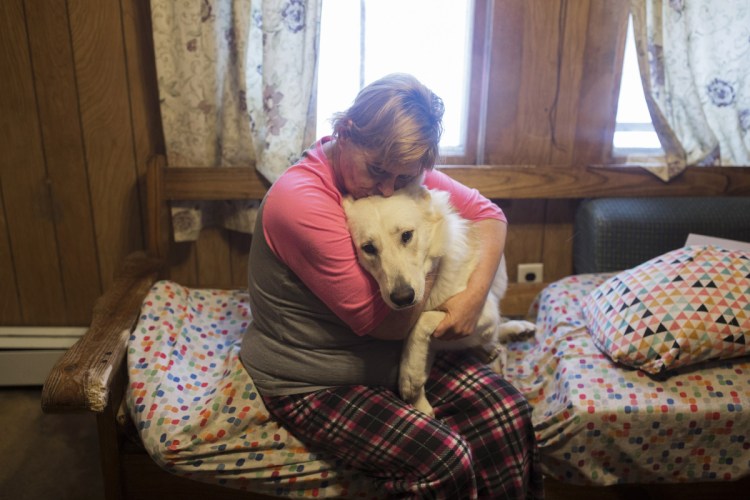A Gray woman facing an animal cruelty charge is seeking to have the 80 dogs seized from her last month returned to the small home she shares with her 91-year-old mother.
Anita McBride’s lawyer asked for a show cause hearing, which gave her a chance to argue Thursday that McBride should get the dogs back. At one point, lawyers for the state went dog-by-dog, asking an assistant state veterinarian who examined the canines as they were removed from the house to describe each dog’s health.
The veterinarian said only a handful were judged to be ailment-free, and that dozens had worms and many had skin or dental problems.
McBride and her lawyer spent more than eight hours trying to convince a judge at Maine District Court in Portland that the dogs should be returned. They were taken from her Jan. 22 after state officials determined McBride had failed to care for them properly since she moved in with her mother in November. The judge said she will rule in the next few days.
McBride is expected to be prosecuted on the animal cruelty charge, a misdemeanor, in the spring.
She has admitted that her mother’s house was a mess when she traveled to Maine from Oklahoma in November, bringing roughly 55 dogs with her. She said the rooms were so filled with totes and bags of belongings, including her mother’s collection of Beanie Babies, that only a narrow corridor existed for walking between most rooms – primarily from the front door to her mother’s recliner, and from there to the bathroom.
But McBride insisted at the hearing that she has made progress in cleaning the small Cape-style house, showing pictures to the judge of several decluttered rooms.
Not enough, state officials said, countering with pictures of the mess that existed while the dogs were there.
State officials visited the Gray house twice in December after a local animal control officer reported that the animals weren’t being properly cared for. They said they found animal feces and urine on the floor, and dogs stored in crates stacked on top of each other. One dog crate held four dogs, state officials said, and there were signs that the animals weren’t given water regularly and that some didn’t go outside often into an 80-foot-by-60-foot enclosure.
Dogs that had recently given birth were housed in rooms that other dogs could access, in violation of a state law that requires mother dogs and their pups a place of solitude.
Once they determined that McBride wasn’t making sufficient progress in improving the situation, officials said, they seized the dogs and cats. The animals have been placed in shelters around the state at a total cost of $400 a day.
Dr. Rachael Fisk, the assistant state veterinarian, told the judge that the smell of ammonia from the dog urine in the house was so strong that she took a meter with her to record the concentration when officials seized the dogs. It read 22 parts per million, she said, just shy of the threshold that would have required workers to don gas masks.
Danielle Jersey, a humane agent for the state Department of Agriculture, Conservation and Forestry, said the stairway to the second floor was so cluttered with trash that the dogs couldn’t go up there. The cats made that their domain, she said, leaving all 80 dogs in the small confines of the first floor. Even the cats seemed to lack proper care, she said, their litter boxes overflowing with feces.
The house’s well is contaminated, so McBride said she obtained water for the animals by filling jugs from a spigot near the town fire house.
State officials said the water bowls were either dry – or, if outside, frozen solid – when they checked.
Will Barry, an assistant district attorney for Cumberland County, said that whatever her intent, McBride doesn’t have the means to properly care for the animals.
She takes in about $950 a month in Social Security disability payments and gets financial help from her husband, who works as a trucking dispatcher in California. She also makes money selling puppies, but she isn’t licensed to run a breeding operation.
McBride said she filed a license application a couple of weeks ago, but she finds the state’s requirements confusing. She also argued that she was trained as a veterinary technician years ago and understands how to care for the dogs, which she called her “babies.”
But properly feeding the dogs and providing them with deworming medicine and regular vet checks would exceed McBride’s ability to pay, Barry said.
Asked Thursday if there were any animals she would part with to help make it easier for her to feed and care for the others, McBride said she would “reluctantly” let her mother’s two cats go and then listed about 11 dogs she would part with, primarily dachshunds.
She did not explain the reasoning behind her choices, but did reject an accusation that the older dogs were the ones she was willing to surrender.
State officials said they also offered to take some of the dogs off McBride’s hands before they were seized, but she repeatedly refused. Jersey, the state humane agent, suggested greed might have played a part.
As the puppies were taken out of the house, Jersey said, McBride sat on the steps and made comments about the lost opportunity to sell the dogs.
McBride said, “There’s $1,000 going out the door. That dog’s worth at least that much,” Jersey recounted.
But Fisk was reluctant to draw a totally negative conclusion from comments like that.
“I don’t think Ms. McBride intended to treat them cruelly,” she said. “But they were treated cruelly.”
Edward D. Murphy can be contacted at 791-6465 or at:
emurphy@pressherald.com
Send questions/comments to the editors.




Comments are no longer available on this story